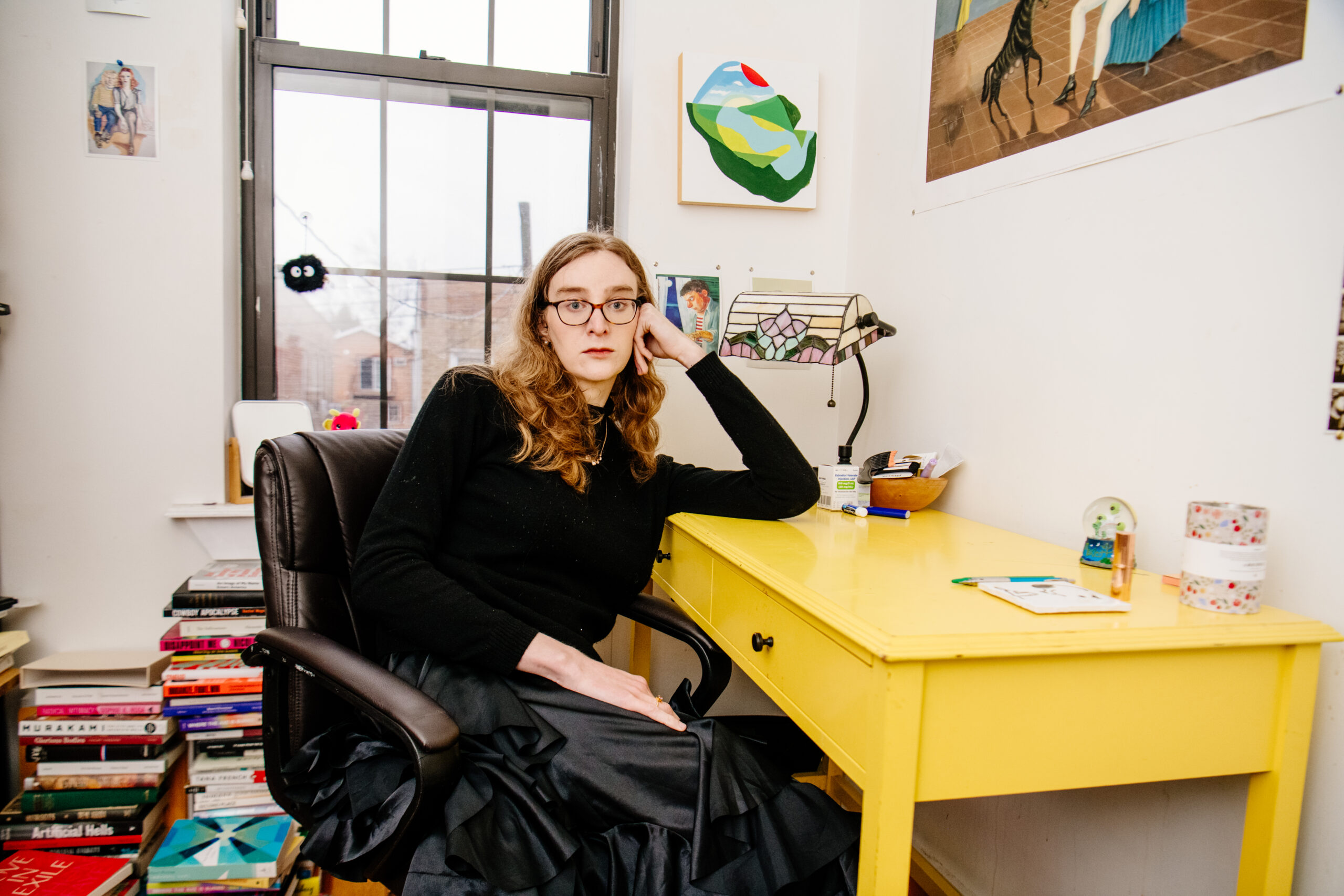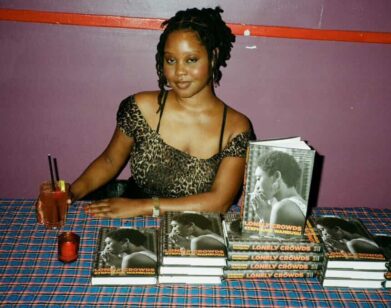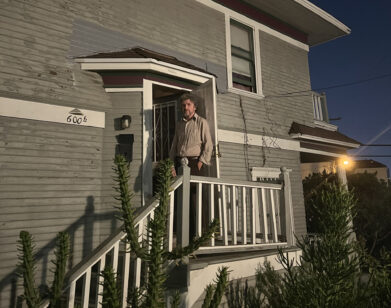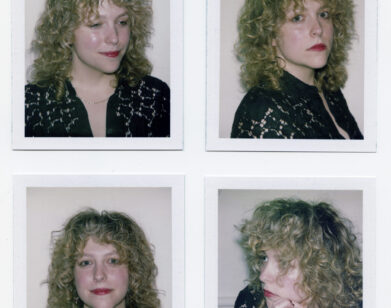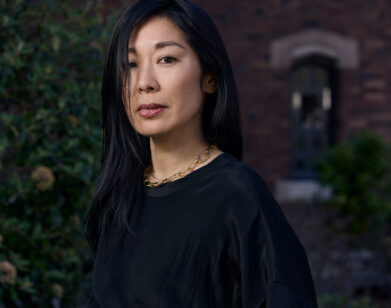IN CONVERSATION
Inside Herculine, the Demonic Trans Horror Novel You’ve Been Waiting For
In the fall of 2021, the writer Grace Byron tried her hand at a memoir, but she kept hitting a wall. “I was really trying to do a sort of Maggie Nelson fragment thing,” she explained, “and it just didn’t work.” In an effort to give her writing a burst, she audited author Tony Tulathimutte’s class and found a way to turn her frustrations with the government’s steady assault on trans rights into the first chapter of what she didn’t yet know was her debut, the equal parts feral and funny horror novel Herculine. Out this week, the book follows an unnamed narrator who escapes to rural Indiana, where her ex-girlfriend has started an all-trans girl commune in the middle of the woods. But—no spoilers!—life on the land doesn’t seem quite right. Last month, as she prepared for Herculine’s release, Byron joined Substack princess Rayne Fisher-Quann to talk faith, jealousy, suffering, and demons.—SIMON DWIHARTANA
———
RAYNE FISHER-QUANN: How are you feeling about putting a book out into the world?
GRACE BYRON: I’m excited. I’m nervous. I’m really curious to see how people end up reading it or how it gets perceived. I think it’s just so different from blogging or whatever. I wrote this in 2022, so there’s also a way where I’m just so ready for it to be out.
FISHER-QUANN: That’s really interesting too becauseI feel that all the time when I’m writing. With a blog, it’s just the most immediate. There’s not even an editor. I write it into the Substack software and then I put it out and then I get—
BYRON: Oh, you do? I love writing into the Substack software.
FISHER-QUANN: I know. It feels like I’m doing something bad.
BYRON: It feels like it’s working a different part of my brain.
FISHER-QUANN: It really does. Often if I’m stuck on something in a Google Doc, I move it into the Substack software and it changes something for me.
BYRON: Oh, that’s so smart. I love the fonts.
FISHER-QUANN: I love the fonts. We’re just glazing Substack.
BYRON: Somebody has to.
FISHER-QUANN: But anyway, you just published this piece in The New Yorker about trans art, and it feels like since 2022 the world has become perhaps even more hostile to trans art.
BYRON: Absolutely.
FISHER-QUANN: What is it like to be putting something out into the world that you wrote in what feels like maybe a different climate?
BYRON: I know it feels hard. I don’t think I would write this kind of book again. I think I have different aesthetic and literary impulses that I would shift. This book is really online in a lot of ways, and the things that I’ve worked on since are a lot less interested in online language, so there’s this way in which it could only have existed at that time, but then it gets read in a different time.
FISHER-QUANN: Totally.
BYRON: Which is always kind of weird.
FISHER-QUANN: It was sort of interesting to read this book as somebody who’s read so much of your criticism because there’s definitely similar themes. You’ve written non-fiction about cults and you’ve written non-fiction about conversion therapy. And I’m curious about the process of writing about similar things, but in non-fiction and then also in fiction. What was that like?
BYRON: I tried really hard in 2020, 2021 to write a memoir, and I just ended up hitting my head against the wall. I was really trying to do a sort of Maggie Nelson fragment thing and it just didn’t work. And that whole time, since I was a kid, I’ve been writing fiction and really liked sci-fi, but I didn’t know how to marry the two. And then I was in Tony Tulathimutte’s class and I wrote a short story that ended up being kind of the first chapter of this book. The voice of it just felt like a condensation of the anger I was feeling at that time, thinking through conversion therapy and thinking through some of the other things that I had a non-fiction preoccupation with, but in a voice that felt playful.
FISHER-QUANN: Reading it, there are of course elements to this that some people would read as famously autofiction, and so on and so forth. But what’s so cool about the horror genre is that it resists autofiction.
BYRON: Yeah, absolutely.
FISHER-QUANN: Because it’s like, there’s demons walking around. And obviously, I don’t even have to say that there’s ideas in place about women who write autofiction and queer people who write autofiction.
BYRON: That’s the only thing they can write.
FISHER-QUANN: [Laughs] Yeah. That’s the only thing they can write, that everything they write is this sort of diaristic, compulsive expression. So I’m wondering if you had that in mind while you were writing, or if the horror element helped with that.
BYRON: Yeah, absolutely. A lot of the book plays with the reader and the reader’s expectations of what kind of a book they think I would write, or a trans person would write, or someone of this age would write. In some ways it starts as this sort of internet novel and then it gets supernatural quickly. And I think that took me by surprise. But when I was writing it, it felt right just in terms of movies I love, like Hereditary. They access something about trauma and pain that traditional autofiction can’t, or at least couldn’t for me. I couldn’t figure out how to write that book, but I could figure out how to write a book where there were other kinds of villains.
FISHER-QUANN: In the book, the presence of those tropes about trans art is so in conversation with the book and both the trans sob story and also the types of ways that trans girls are usually represented in media. There’s a line in the book that says, “In all the movies, the trans girl exists in isolation.” And this book is so the opposite of that. The character is constantly surrounded by other trans women, which I think is really beautiful and really effective. But the book really shows both the beauty of that, and also the great and very specific suffering, the specific types of pain and reinforced trauma and cycles of trauma that can be enforced in those types of communities.
BYRON: Absolutely.
FISHER-QUANN: It’s always so tricky to write about that type of suffering, especially in—I’m hashtagging—these times.
BYRON: No, it’s very politicized.
FISHER-QUANN: It’s so politicized. And when everybody’s saying, “You guys are evil, there’s something monstrous about you,” there’s this impulse to circle your wagons and be like, “No, we’re great.”
BYRON: We’re perfect.
FISHER-QUANN: We’re perfect. There’s nothing wrong with us.
BYRON: Only good representation!
FISHER-QUANN: Only good representation, and that feels like a protective mechanism. It feels scary sometimes to be actually like, “Famously, we are people, so we can be evil and do evil things.”
BYRON: Absolutely. But I think it’s important and more interesting to write about trans women behaving badly. It’s just a more interesting narrative to me. Obviously, people can politicize or weaponize that. But it felt important and tricky to write about. And I’m not saying separatism is inherently evil—just that, as a political strategy, it can be limited.
FISHER-QUANN: Yeah, totally. And this fantasy that all queer people or all women are inherently good or is actually its own type of dehumanization and fetishization.
BYRON: Well, it’s like putting someone on a pedestal. You can knock them down a lot easier than if you don’t really think about it.
FISHER-QUANN: And it was really interesting to see this in the horror genre, too, which has such a storied history of being on the vanguard of excavating those issues and talking about them really intelligently. What was it like to write in that genre around these ideas about monstrosity and evil?
BYRON: That’s a good question. There’s a way in which the trans women in the book are sort of debating whether or not they’re using the demons or being used by the demons. And in a lot of ways, that [reflects[ the sort of tension of representation in media: is this something that’s being exploitative, or is it being interesting and liberatory? But I think it’s never one or the other. It’s always a murky thing of who’s using who and how and how do those things get built into dynamics of friendship or social privileges or race or gender or class. Those things all complicate community. And I think the idea that a fully separate community off the grid will never recreate the same hierarchies, it’s just sort of impossible. You’re going to recreate some of that because you carry that.
FISHER-QUANN: Yeah, totally. And I think it’s like—oh my gosh, I lost my train of thought. [Laughs] Well, I can’t remember at all what I was going to say, but yeah. But one line in the book that I thought was beautiful and got stuck in my head was, “None of the girls are faithless. All of them believed in something.” I thought that was a really interesting idea. And this is a total swerve, I guess, but I’m curious to hear your thoughts about faith in marginalized communities or in the queer community.
BYRON: Absolutely. Something I was really thinking through is, “What do you replace faith with if you feel like the faith community that you were born into has abused you or broken you down or hurt you?” I know a lot of people who are queer and trans and who are so Christian, and that’s complicated for me.
FISHER-QUANN: Of course.
BYRON: But I do really admire [those who] have a strong faith tradition, a strong church body. That’s really cool and important. And there’s a lot of queer and trans people who do actually feel strongly about having that in their life in some way, whether that’s being Christian or being Buddhist or being Jewish or being Muslim or whatever. I think reclaiming that space is really interesting and important. And in this book, the main character kind of ends up going with this much more non-dualistic way of thinking in order to sort of escape the topology of Christianity. She was like, “I can’t argue with whether or not this is true, or whether or not this is right, I can just say it’s not working for me right now and step away.” So I think stepping away becomes a non-dualistic way of learning acceptance. I used to go to a Buddha’s Sangha. I don’t anymore, but I have a lot of interest in reading about different faith traditions and spirituality. And I think some of those certainly influenced the book.
FISHER-QUANN: Totally. I also have sort of a complicated connection to it. Recently I was really feeling a desire to go to confession.
BYRON: Oh, absolutely.
FISHER-QUANN: Point blank, period. It’s the best thing ever. And I was really considering it. I was talking to my mom about it and I found a church to go to and I was looking at the website and they had a confession guide, but that church’s philosophy around confession, it had a list of things you should confess for. I was feeling so moved by the idea of doing this. And then I look at the guide and it’s like, “Well, you have to confess if you’ve helped your friend get an abortion,” and if you’ve had gay experiences and all this stuff. And it’s so obvious to say that it feels silly, but it really did strike me down all over again. I was just like, “Well, I can’t.”
BYRON: It feels like a betrayal.
FISHER-QUANN: It said that you had to confess if you had had suicidal thoughts before.
BYRON: Wow.
FISHER-QUANN: It’s all the stuff that I have known about the church my whole life, but it really did hit me anew where I was like, “How do I balance the deep need for faith that I have and the love that I have for this ritual with the need to not actually say that me and all my friends are evil”?
BYRON: Yeah, and in the age of modernity, there is this kind of dismissal of belief when I think people have a deep hunger for ritual and spirituality and belief. I really admire and am in awe of people who have strong faith traditions and strong beliefs, especially people who can navigate it with a rigorous morality.
FISHER-QUANN: Yeah, totally. My last question is a little off-topic, but another part of the book that I really liked and related to in many ways was how it’s also about being a writer, and about being a writer in New York, and the types of competition and jealousy that can exist within communities of women writers.
BYRON: Do you feel jealous of people?
FISHER-QUANN: Oh, for sure. But it’s such a strange jealousy, an ugly, ugly feeling.
BYRON: Oh, it’s the worst feeling. It doesn’t do anything.
FISHER-QUANN: Yeah, it does absolutely nothing. It doesn’t make me a better writer. It interrupts my ability to engage with art. Like when you are reading something and you have a voice in the back of your head that’s like, “Oh god, could I ever make something like this? Is this person better than me?”
BYRON: “Should I have written this?”
FISHER-QUANN: It’s just totally massacring. It interrupts your ability to engage in a pure way with the medium. But yeah, the narrator in the book writes from a specific perspective of a struggling writer, a writer who doesn’t have the certain things that the hot freelance girls have. And of course I was thinking, “Well, now it’s Grace Byron with The New Yorker byline and the book deal.”
BYRON: I know. I couldn’t write that now because it would be insincere. At the time I felt very much like a nobody and there were all of these people who I felt resentment towards because I was like, “Well, you have the career that I want.” But now I’m friends with those people. And I don’t remember where I learned this but somebody was like, “I realized that all the people I was jealous of, I actually wanted to be friends with.” And I was like, “What a beautiful reframing.” And maybe now we can talk about reading together. We can talk about being in the trenches together. We can celebrate each other too. And I think that’s really good.
FISHER-QUANN: Totally. I’ve had that too. But how has the form of your jealousy changed, if it has?
BYRON: I think perhaps the jealousy that I felt at one point was of people who had the career I wanted, and now it’s of people who get things easier because they are not trans, which is a different kind of jealousy.
FISHER-QUANN: Totally.
BYRON: It’s more like society has made a world where it’s harder for trans people to have material rights or to have housing or jobs or whatever.
FISHER-QUANN: And it feels more easily translated into a productive anger.
BYRON: Well, sometimes.
FISHER-QUANN: Maybe.
BYRON: I think it’s hard to manage. I mostly feel lucky to be at a place where I’m not writing facile essays about how trans people are people. There are a lot of those essays. And I feel really lucky. I really admire my editor at The New Yorker. She’s really smart and let’s me write about specific material conditions and specific ideas that are not so, “Trans rights are rights.”
FISHER-QUANN: 101. “Protect the Dolls” t-shirt.
BYRON: Exactly. Along the way, I’m sure I wrote things that were more trans 101 for people who needed it. But I feel grateful for where I’m at now.
FISHER-QUANN: Hooray. What an amazing note to end on, and what an amazing book. I can’t wait for it to come out.
BYRON: That was so good.

